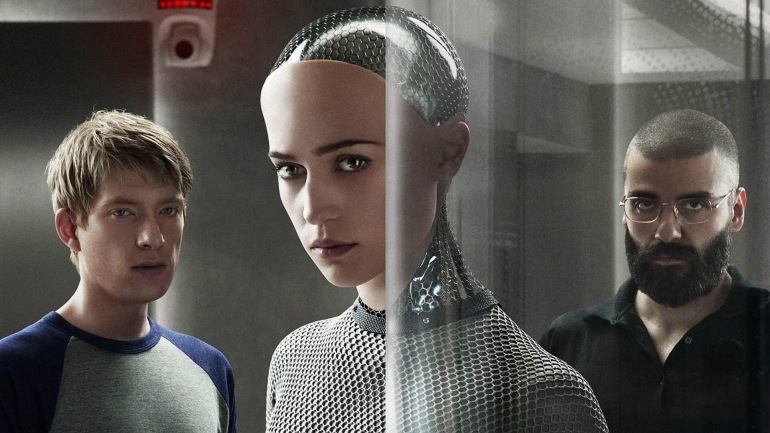I’m not sure where it comes from, this innate fear of artificial-intelligence. Does it possibly come from our own sense of insecurity? Our fear of our own inadequacies? Or might it derive from the self-awareness of exactly how destructive and malicious a species we can be? Wherever this fear of sentience stems from it is apparent in literature, with Asimov drafting the now legendary “Three Laws” which he then used as a basis for his stories many of which showcased how robotic entities subverted this programming. And our film culture is rife examples of our fear with “Terminator’s” Skynet, “Robocop’s” main character and various malfunctioning villains, “2001 Space Odyssey’s” Hal and even the heart-wrenching atrocities showcased in Spielberg’s “A.I.” For every “Wall-E” we have dozens of “Chappie,” “Blade Runner,” or “Avengers: Age of Ultron” story that showcase either destructive artificial intelligence intent of extinguishing us all or that show us striving to viciously eliminate the A.I. Either way the fear and violence drive the narrative. “Ex Machina” is another film to add to this expansive list. It strips down the cast, gives us a trifecta of characters to focus on in a gorgeous and isolated setting, then forces us to journey through the labyrinth with them all.
—
The hinge, upon which “Ex Machina” keeps us swinging wildly, is Ava (Alicia Vikander) who grounds the film as the A.I. in question. Domhnall Gleeson (“Dredd”) brings breathtaking vulnerability to the role of Caleb, a programmer selected to administer the Turing Test to determine is Ava is truly sentient A.I. Rounding out the cast is Oscar Isaac (“Drive”) as Nathan, creator of BlueBook, the most popular search engine in use, Ava’s creator and Caleb’s boss. Each character is fabulously written, in one scene they present one aspect, then another side is presented in a different scene, which allows us to challenge and constantly change our perspective on each.
—
I changed my mind the most about Nathan who initially struck me as an egomaniac with a god complex. Then ensuing scenes allowed me to view him as a tortured genius, cruel pragmatist, and lonely soul longing for more companionship. Caleb and Ava each changed as well and allowed me to suspect methods and motivations for ultimately this is what drives the film, who is charge at any given time. At times Ava seemed threatening, while others I was sure she was manipulative, then others I was utterly convinced she was genuine, even afraid. She manages to communicate all of this alone, sitting on the other side of a glass window apart from every other character for almost all the film, for isolation is another strong theme present throughout the narrative.
—
The isolated and fantastic setting helps reinforce this question of control. Key cards that are used to allow access, or deny it, to rooms and spaces; long columned hallways; rooms without windows; hidden patches of nature intruding yet constantly as isolated and contained as our characters. This setting helped super-charge the relationships and make each encounter more meaningful. The layered technical speak is broken down into layperson’s terms for greater comprehension. The way that Ava and Caleb and Nathan and Caleb verbally spar is remarkable. Each scene and line of dialog is carefully crafted by writer/director Alex Garland (writer of “28 Days Later”) and increases weight of interaction of each additional meeting.
—
As Caleb struggles to find footing in this strange world he begins to doubt everything. Is Nathan lying to him? Is Ava misleading him? Is it possible, even, that he is just paranoid? When humanity can be duplicated and synthesized where does reality begin, or blur? Where does it disappear? Gleeson is exceptional at verbally and non-verbally communicating all of this struggle and after watching the spotlight on him in “Ex Machina” I can only imagine great things in his acting future.
—
“Ex Machina” is not afraid to ask the hard questions about A.I. like: should we, is it question of it or when, or even what are the moral implications for us and the A.I. when A.I. is created? It seems that the general consensus is that the development of A.I. spells our end, not just in films like “The Matrix” or “I, Robot” but even in great scientific minds like Stephen Hawking who have publicly spoken out against A.I. and how it will fuel our extinction. I found “Ex Machina” inspiring, probably significantly more-so than it meant to be.
—
I honestly believe that if a sufficient A.I. is ever developed then we need to only do so in a reasonable space, one where A.I. is understood and already protected. The sad fact is that our world can’t deal with itself, do we really need the complications of another sentient being capable of seeing that it’s not wanted, feared, and hunted; one that is capable with today’s technology of 3-D printers readily available to self-repair, to think, further self-develop, and decide to just eliminate the problem: us? Maybe all our fears of A.I. are just a metaphor, a manifestation of our terribly real ability to even deal with each other on a personal, local, national, or global level without resorting to violence or anger. Perhaps we should take a page out of these books and films, look real closely at these stories and try to fully understand what they are saying. Everything that happens in “Ex Machina” is easily understandable, and terribly coherent. Wrapped in a tragic, gorgeous story of three characters locked away with each other. Each is relatable in their own way and we could stand to learn much from them.
